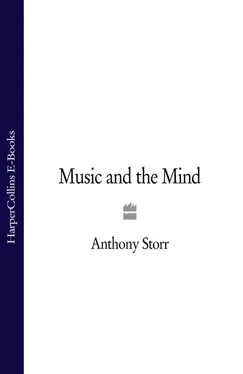ANTHONY STORR

MUSIC AND THE MIND
‘Music’s the Medicine of the Mind’
John Logan (1744–88)


Copyright Copyright INTRODUCTION CHAPTER I ORIGINS AND COLLECTIVE FUNCTIONS CHAPTER II MUSIC, BRAIN AND BODY CHAPTER III BASIC PATTERNS CHAPTER IV SONGS WITHOUT WORDS CHAPTER V ESCAPE FROM REALITY? CHAPTER VI THE SOLITARY LISTENER CHAPTER VII THE INNERMOST NATURE OF THE WORLD CHAPTER VIII A JUSTIFICATION OF EXISTENCE CHAPTER IX THE SIGNIFICANCE OF MUSIC Keep Reading References Bibliography Index Acknowledgements About the Author By the Same Author About the Publisher
HarperCollins Publishers Ltd. 1 London Bridge Street London SE1 9GF
First published in Great Britain by Collins 1992
Copyright © Anthony Storr 1992
The author and publisher gratefully acknowledge permission to reproduce extracts from:
Hitler: The Fuhrer and the People , J.P. Stern (Fontana Press, 1975); Schoenberg , Charles Rosen (Fontana, 1976); The Origins of Consciousness in the Breakdown of the Bicameral Mind , Julian Jaynes, © 1976 Julian Jaynes, reprinted by permission of Houghton Mifflin Co. and Penguin Books Limited.
Anthony Storr asserts the moral right to be identified as the author of this work
A catalogue record for this book is available from the British Library
All rights reserved under International and Pan-American Copyright Conventions. By payment of the required fees, you have been granted the non-exclusive, non-transferable right to access and read the text of this ebook on-screen. No part of this text may be reproduced, transmitted, down-loaded, decompiled, reverse engineered, or stored in or introduced into any information storage and retrieval system, in any form or by any means, whether electronic or mechanical, now known or hereinafter invented, without the express written permission of HarperCollins ebooks
HarperCollins Publishers has made every reasonable effort to ensure that any picture content and written content in this ebook has been included or removed in accordance with the contractual and technological constraints in operation at the time of publication
Source ISBN: 9780006861867
Ebook Edition © JANUARY 2017 ISBN: 9780007383993
Version: 2017-02-08
FOR
SOPHIA, POLLY, AND EMMA
WHO SHARE MY LOVE
OF MUSIC
Cover
Title Page ANTHONY STORR MUSIC AND THE MIND ‘Music’s the Medicine of the Mind’ John Logan (1744–88)
Copyright
INTRODUCTION
CHAPTER I ORIGINS AND COLLECTIVE FUNCTIONS
CHAPTER II MUSIC, BRAIN AND BODY
CHAPTER III BASIC PATTERNS
CHAPTER IV SONGS WITHOUT WORDS
CHAPTER V ESCAPE FROM REALITY?
CHAPTER VI THE SOLITARY LISTENER
CHAPTER VII THE INNERMOST NATURE OF THE WORLD
CHAPTER VIII A JUSTIFICATION OF EXISTENCE
CHAPTER IX THE SIGNIFICANCE OF MUSIC
Keep Reading
References
Bibliography
Index
Acknowledgements
About the Author
By the Same Author
About the Publisher
Since music is the only language with the contradictory attributes of being at once intelligible and untranslatable, the musical creator is a being comparable to the gods, and music itself the supreme mystery of the science of man.
CLAUDE LÉVI-STRAUSS 1
Today, more people listen to music than ever before in the history of the world. The audience has increased enormously since the Second World War. Recordings, radio, and even television, have made music available to a wider range of the population than anyone could have predicted fifty years ago. In spite of dire warnings that recordings might empty opera houses and concert halls, the audience for live performances has also multiplied.
This book reflects my personal preference in that it is primarily concerned with classical or Western ‘art’ music, rather than with ‘popular’ music. That these two varieties of music should have become so divergent is regrettable. The demand for accessible musical entertainment grew during the latter half of the nineteenth century in response to the increased wealth of the middle class. It was met by Offenbach, both Johann Strausses, Chabrier, Sullivan, and other gifted composers of light music which still enchants us today. The tradition was carried on into the twentieth century by composers of the stature of Gershwin, Jerome Kern, and Irving Berlin. It is only since the 1950s that the gap between classical and popular music has widened into a canyon which is nearly unbridgeable.
In spite of its widespread diffusion, music remains an enigma. Music for those who love it is so important that to be deprived of it would constitute a cruel and unusual punishment. Moreover, the perception of music as a central part of life is not confined to professionals or even to gifted amateurs. It is true that those who have studied the techniques of musical composition can more thoroughly appreciate the structure of a musical work than those who have not. It is also true that people who can play an instrument, or who can sing, can actively participate in music in ways which enrich their understanding of it. Playing in a string quartet, or even singing as one anonymous voice in a large choir, are both life-enhancing activities which those who take part in them find irreplaceable. But even listeners who cannot read musical notation and who have never attempted to learn an instrument may be so deeply affected that, for them, any day which passes without being seriously involved with music in one way or another is a day wasted.
In the context of contemporary Western culture, this is puzzling. Many people assume that the arts are luxuries rather than necessities, and that words or pictures are the only means by which influence can be exerted on the human mind. Those who do not appreciate music think that it has no significance other than providing ephemeral pleasure. They consider it a gloss upon the surface of life; a harmless indulgence rather than a necessity. This, no doubt, is why our present politicians seldom accord music a prominent place in their plans for education. Today, when education is becoming increasingly utilitarian, directed toward obtaining gainful employment rather than toward enriching personal experience, music is likely to be treated as an ‘extra’ in the school curriculum which only affluent parents can afford, and which need not be provided for pupils who are not obviously ‘musical’ by nature. The idea that music is so powerful that it can actually affect both individuals and the state for good or ill has disappeared. In a culture dominated by the visual and the verbal, the significance of music is perplexing, and is therefore underestimated. Both musicians and lovers of music who are not professionally trained know that great music brings us more than sensuous pleasure, although sensuous pleasure is certainly part of musical experience. Yet what it brings is hard to define. This book is an exploratory search; an attempt to discover what it is about music that so profoundly affects us, and why it is such an important part of our culture.
CHAPTER I ORIGINS AND COLLECTIVE FUNCTIONS
Читать дальше















